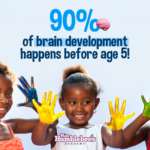It may seem odd to think about the start of kindergarten with eight months to go until the next school year, but some school systems are already busy enrolling students. If your child is eligible to enter kindergarten in the fall, you may have concerns about whether or not he’s ready. Simply being the right age is not an accurate measure of kindergarten readiness.
Kindergarten Readiness: What It Is and How to Get There
But what is an accurate measure? Before we tackle that question, let’s answer this one:
What is kindergarten readiness?
Many factors go into kindergarten readiness, including academic, social, and physical considerations. While the following list is not all-inclusive, nor set in stone, it should give you an idea of the basic expectations of a child entering kindergarten.
(It should also be noted that all of these skills are things that will continue to be worked on and improved as the school year goes on. For example, children are expected to know how to share, but no one expects them to do it perfectly 100% of the time.)
Academic– Despite our feelings in favor or against the way the education system is run in the U.S., expectations for kindergartners are much higher than they were in years past. While it may differ from school to school, children entering kindergarten are often expected to know letters, shapes, colors, and numbers, as well as how to write their own name.
Social– Due to the social nature of the classroom setting, children entering kindergarten should be able to follow directions, take turns, and share. They should also be able to perform basic personal care skills, such as using the bathroom independently and blowing their own noses.
Physical– Children entering kindergarten will need both gross and fine motor skills in order to succeed. These include running, jumping, throwing and sitting still for short periods of time, as well as holding a pencil and using scissors.
Is your child ready?
Now that we’ve determined what kindergarten readiness is, you should have at least a slightly clearer picture of if your child is ready for kindergarten. It is important to note, however, that every child has various strengths and weaknesses, and just because a child may not be entirely ‘ready’ in one area doesn’t necessarily mean that he isn’t ready at all.
Take a big picture view to determine what is right for your child. While parents have the most intimate knowledge of their children’s development, preK teachers, daycare workers, and pediatricians are great people to talk with to help determine readiness.
It’s also important to remember that children can develop at astonishing rates. Sometimes you won’t notice any growth in an area for months and suddenly, almost over night, your child has developed an entirely new skill. With eight months to go until the start of the new school year, it is almost certain that your child will have learned many new skills by the time the school bell rings.
How can you help your child get there?
There is something to be said for letting your child develop at his own pace. Trying to force a skill that he’s not ready for will not only result in disappoint, but can also turn your child off from whatever you are trying to teach.
Even so, there are many things you can do with your child to help him get ‘kindergarten ready’. Be sure to take his interests and learning style into account and pay attention to the cues that indicate boredom or frustration. A bit of frustration is okay and teaches determination, but too much will have the opposite effect.
Academic– Your child is expected to know basic literacy and mathematical concepts when entering kindergarten and there are innumerable ways to help your child with them. These two posts are full of great ways to teach your child without him even knowing it:
You’re Teaching Your Child Literacy Skills Without Even Realizing It!
You’re Teaching Your Child Math Without Even Realizing It!
Another great resource is our online learning academy that teaches skills in a fun and memorable way. We offer weekly progress reports that help parents identify their child’s strengths and potential trouble spots, as well as cognitive skills assessments that provide a baseline of kindergarten readiness.
Social– Offering your child plenty of opportunities to be with other children is an important first step in developing the social skills necessary for kindergarten. Another great way to develop these skills is through pretend play and role playing a variety of social situations your child might find himself in.
Physical– Making sure that your child has plenty of opportunities for both gross and fine motor activities will go a long way in helping him develop his skills.
Spend time outside where gross motor activities are a given. Let him explore, climb, run, and play.
To develop fine motor skills, allow your child to use a variety of media. Let him color, paint, cut, and tear paper. Give him a pair of tweezers and let him move beans from one jar to another. Grab a shoelace and show him how to string beads on it. Make play dough together, then let him mold and create with it. Remember: It is the process, not the end product, that matters.
Deciding whether your child is ready for kindergarten can be a difficult and many-factored decision, but hopefully you now have a clearer picture of what is expected and how you can help your child get there.











